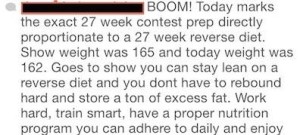Reverse Dieting
There really is no BOOM about this.
Reverse Dieting.
Listen, the IDEA behind reverse dieting is sound in some cases but the execution of this concept is in my opinion, rarely done properly.
Let’s just look at this quote for starters. The author is irrelevant to the point of the post as I have nothing against this person as the author’s posts are typically good (including the last sentence). That said, if you reverse dieted for 27 weeks post contest only to be 3lbs LIGHTER and NOT as lean as you were on contest day, then what does that mean? Certainly not fat loss. So what was lost? I can’t see any other way this cannot suggest muscle loss. So no boom. What else is wrong with this? 27 weeks of reverse dieting to LOSE weight? Nearly 7 months? Come on! You’ve reverse dieted yourself into absolutely no improvements for 7 months. This is not how it’s done.
Now, if you diet down for a contest sanely (as the author promotes), properly and without any extreme measures there is no need for any real reverse dieting and certainly not to this epically slow extent. Get your butt to maintenance as fast as you can. The sooner you get to maintenance the sooner you start doing your body a host of metabolic and hormonal favours.
The author also talks about if you reverse diet you don’t have to rebound. Well, to me this reflects a lack of understanding behind the causes of rebounds. There are two:
1. Simple post-contest gluttony. Here, you’re just rebounding because you’re flat out overeating and this really isn’t outside of the norm for those who diet with such rigid dietary boundaries. The more restrained your eating, the more you will go haywire on food when the chains are taken off.
2. A metabolic rebound. This is the telltale sign of a problem – a disproportionate amount of weight/fat gain for a given amount of food. That is, the weight/fat gain, doesn’t at all match the caloric intake. Everyone who shares their rebound story seems to say sure, they ate after their show, but not so much that it justifies the ridiculous weight gain. Again, a disproportionate amount of weight gain for a seemingly normal amount of calories.
The author was not trying to counter #2 and thus a 27-week reverse diet is totally unnecessary.
These are two VERY different scenarios. What the diet sets in motion, you cannot really stop or prevent once it’s set in motion. Attempting to counter-diet a metabolic rebound prolongs the time you spend in a deficit, which is the problem to begin with, delays recovery, and makes the whole issue worse.
So one, if you diet down for a contest using a sane, flexible and balanced approach that works with your body and not against it, coaxing it instead of forcing it, you will not have to bother with all of this slow reverse dieting. Just get to maintenance as quickly as you can so you can allow the body’s regulatory systems to normalize as best they can.
Two, if you DID diet down in a moronic and extreme way, yes, adopt the reverse dieting strategy and systematically raise calories to maintenance instead of all at once … BUT, still do it as fast as possible, not as slow as possible as so many seem to be doing and suggesting. Again, you’re in a deficit – THAT is the problem. Get out of it! Staying in it longer adding 20 calories (sarcasm) per week is nonsensical and as I said, just serves to delay recovery.
Case in point, I have a returning client who for a time tried another method of contest prep. Sadly, she came back with major metabolic consequences, a rebound, doing a lot of cardio, eating very little and yet a totally unresponsive body. MY goal at the outset is clear. Shelf the fat-loss goals, since the cause of the problem (dieting/a deficit) cannot also be the solution to the problem, and get this girl to maintenance as fast as I can as THAT is the point that any potential recovery STARTS, not before. I cut all the cardio out and systematically took this client from what she was doing to 15x BW with no further increase in bodyweight.
So as I said before, this is a case where the reverse dieting concept makes sense but again, within reason, do it quickly. So, we start at X calories, two weeks later we see what’s happened. Weight stability (after the naturally expected weight gain post contest)? Raise calories by around 10% or so of bodyweight, give it two weeks and see what happens. Rinse and repeat until you’re at maintenance. The goal of course is weight stability at each increase (then weight stability for an extended period of time at maintenance), but this may not be possible depending on the severity of the issues so you may have to accept at least some unwanted weight gain along the way as it is not unusual to get a little worse before you get better as the body tries to correct itself. You have to let your body to do what it NEEDS to do (recover) and stop FORCING it to do what it doesn’t want to do (spend any more time in a deficit dropping body fat).
